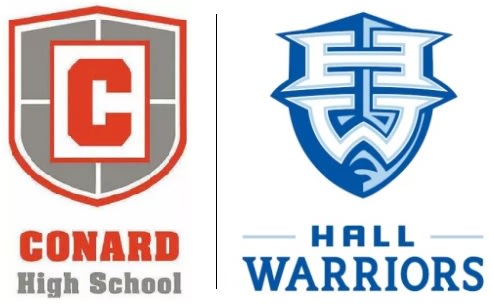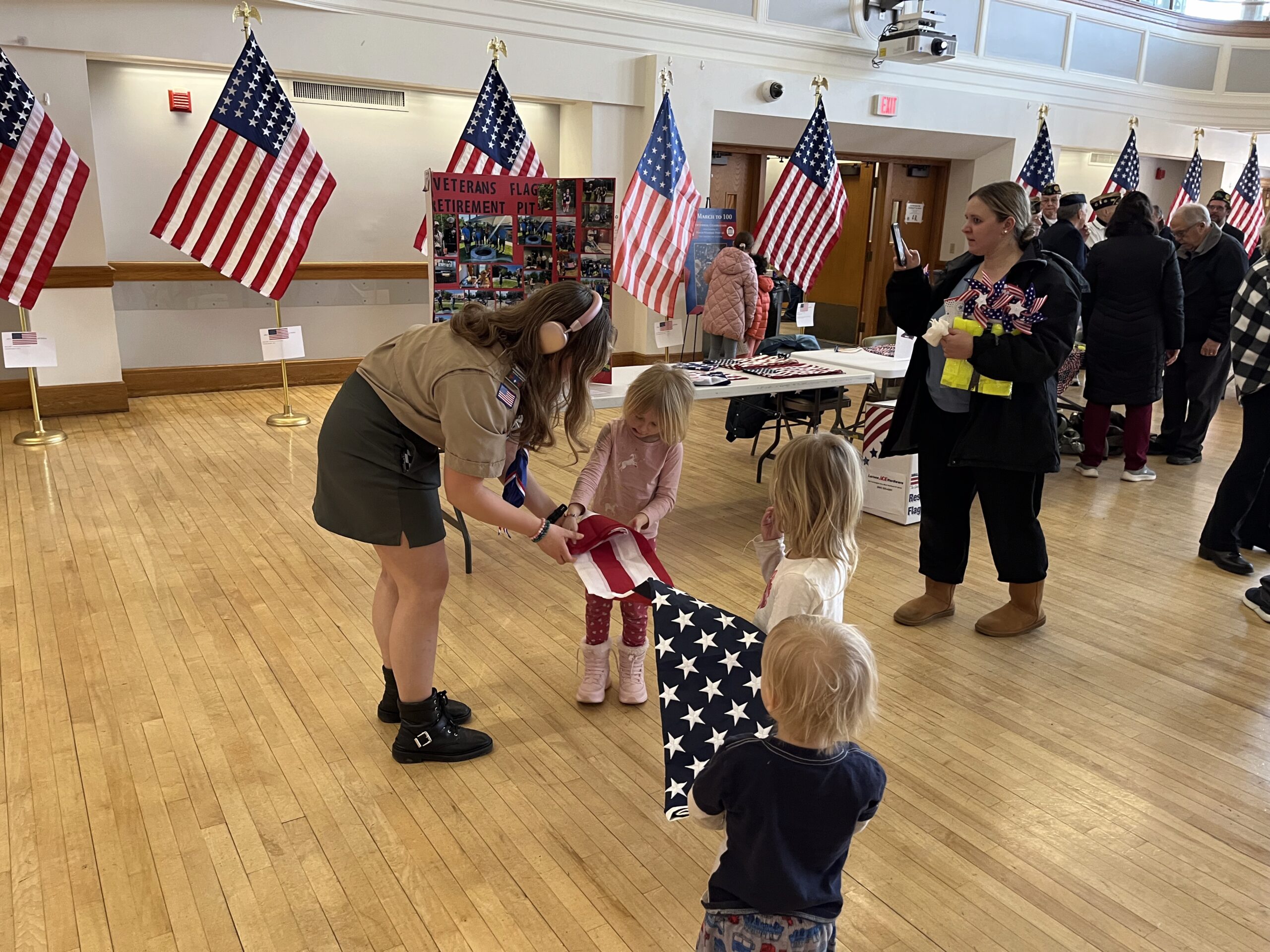West Hartford Board of Education Votes to Allow Native American Tribal Leaders to Share Opinions on Mascots

Audio By Carbonatix

West Hartford resident Scott Zweig was one of many speakers during the public comment session of the April 19, 2022 Board of Education meeting. Photo credit: Ronni Newton (we-ha.com file photo)
The West Hartford Board of Education voted Tuesday night on a motion to invite the leaders of Connecticut’s recognized Native American tribal nations to address the May 3, 2022 meeting.

West Hartford Public Schools website image
By Ronni Newton
Following a lengthy debate on a motion raised by Republican Ethan Goldman, the West Hartford Board of Education voted 4-3 in favor of inviting the leaders of Connecticut’s five nationally- or state-recognized Native American tribal nations, or their designees, to speak at the May 3, 2022 meeting regarding their opinions about mascots, nicknames, and imagery.
Goldman said the intent of his motion is to educate Board members through a direct conversation with Native American leaders and facilitate greater context. Nothing in the motion mentioned revisiting the Board’s Feb. 1, 2022 decision to change the town’s public high school nicknames from Warriors and Chieftains.
Goldman and fellow Republican Gayle Harris, as well as Democrats Deb Polun and Clare Taylor Neseralla, voted in favor of inviting the tribal leaders to address the Board regarding mascots, imagery and nicknames. Chair Lorna Thomas-Farquharson, and Democrats Ari Steinberg and Jason Chang, voted against the motion.
The West Hartford Board of Education voted on Feb. 1 to change the nicknames of Conard and Hall, and the process is well underway at both high schools to develop new names and mascots – alternatives to the current Chieftains and Warriors – which are scheduled to be presented to the Board in mid May. The Board has committed to approving the new names by its June 7 meeting at the latest.
Thomas-Farquharson confirmed prior to voting to allow the tribal leaders to address the Board that the process of choosing new names and imagery will continue.
Last fall, prior to the Feb. 1 vote, the Board had reached out to all five of the state- and/or federally-recognized tribal nations to request their input about the Conard and Hall team names. Letters, that included images of the current logos, were sent to the Mohegan Tribal Council, the Mashantucket Pequot Tribal Nation, the Eastern Pequot Tribal Nation, the Golden Hill Paugussett Clan Mother, and the Schaghticoke Tribal Nation.
A proposal to change the nicknames first appeared on the Board’s agenda for the Dec. 7, 2021 meeting, and was also prompted in part by the passage of legislation last summer which could impact the town’s budget.
According to Thomas-Farquharson, consideration of the nicknames was a continuation of the process that began in 2015, when the Board decided, with a unanimous vote that followed an extensive public outreach process, to maintain the Conard Chieftain and Hall Warrior names but remove all Native American imagery.
Since then, the Board of Education has adopted an educational equity policy. Thomas-Farquharson said in February that the school nicknames are offensive to the Native American population, and have been condemned by Native American tribes and organizations. While input the Board received from the tribes have not necessarily specifically addressed Conard and Hall, “they clearly acknowledge the offense of the terms,” she said, and are not honored by their use.
Prior to the vote, three responses were received to the Board’s request, and the response from the Mashantucket Pequot spokesperson was a restatement of the language in PA 21-2. Those responses are posted on the Board of Education’s website, along with a statement from the National Congress of American Indians from 2015.
Chief Richard Velky of the Schaghticoke Tribal Nation responded on March 15 (see PDF below). Resident Scott Zweig, who has been leading an effort to get signatures on a petition requesting the Town Council address the issue or allow the electors to decide, was hoping that Velky would have been permitted to address the Board on Tuesday in a format other than the three minutes allowed members of the public during the comment session. According to Zweig, the chief decided it would not be worthwhile just to have three minutes to speak.
Goldman said he would like to hear what Velky and the other tribal leaders have to say. “While we received several letters from the tribes I found the letters ambiguous and open to multiple interpretations,” he said.
“I think it’s important that we complete the loop,” said Goldman.
“I feel that the way we’ve handled this process is not really the best way we could have handled it,” Harris said. She said none of the Board members are Native American, “and at the end of the day I think it’s very important to hear from the Native Americans. … It would be interested in hearing from all the different tribes if they would come to speak with us.”
Steinberg said she agreed it would be good to hear from the tribal leaders “if the purpose is to provide education and to get a broader understanding,” but not as part of reconsidering the Board’s Feb. 1 decision. She suggested that perhaps a forum be held at another venue such as the library.
Chang said inviting the chiefs for a discussion “would be a replication of the process that has already been established,” and noted that there have already been letters received from the tribes. “One of the things we learned from this is that the mascots have no educational value; we really don’t learn much from mascots,” Chang said, “but we have established that the names do present harm for students.”
The mascots become lightning rods, he said, and “if we are to honor Native American folks, team names are not the way to do it.”
Conard student representative Andrew Maglio noted that while students have been very eager to choose new mascots, he doesn’t think inviting tribal leaders for a conversation would be a reversal. When he surveyed students he said the opinion shared by a student who is Native American, who was disturbed by the Chieftain name, was very powerful. “When we have the opportunity to listen to somebody … I don’t know how we could refuse,” Maglio said.
Hall’s student representative, Avery Woods Weber, said that while a majority of Hall students surveyed were in favor of keeping the Warrior name, “30% of the students wanting to change the name is still a significant percentage.” She noted, however, that opening the lines of communication with the tribal nations could be beneficial. “It would be very positive for our community to be more informed,” she said.
Chang said what many Native Americans want is their land back, and Polun said while it’s an important point to consider repairing the damages done, that’s another deep discussion.
“We can’t do that as a board of education, but we can invite our Native American leaders to address us … at least for a beginning conversation about a topic that we have brought forward,” Polun said.
“It could be healing to hear from our local tribal leaders,” she said. Just like the Board receives reports on important topics from staff and invites them in for deeper discussion, this would allow the Board to hear directly from those most affected.
“Nothing about us without us,” is an important saying in the advocacy community, Polun said.
“As I look around this room I see something is missing,” Zweig told the Board Tuesday during the public comment session prior to Goldman’s motion being raised. He was one of five residents who spoke Tuesday about the high school nicknames. Three residents who spoke about the topic criticized the Board’s decision, while two supported it.
Zweig said that Velky and the chiefs of the other tribes should have been able to speak to the Board directly. “You claim the decision to erase Warrior and Chieftain was meant to protect,” he said. “Maybe if you actually let them speak they could tell you. … None of you speak for Native Americans, you should let them speak for themselves.”
Following the vote to invite the tribal leaders for May 3, Zweig told We-Ha.com, “I am pleased that the Board has agreed to host representatives of Connecticut’s five recognized Native American tribes. Their opinions should carry enormous weight on this issue. However, based on the comments from several Board members tonight, it appears this may be an empty gesture aimed at pacifying those of us who wish to retain the Warrior and Chieftain names. After hearing from the tribal leaders, I would like to see the Board revisit their prior decision and hold a new vote. I am hopeful that everyone will keep an open mind.”
Thomas-Farquharson told We-Ha.com Wednesday that invitations will be sent out to the tribe leaders via email, and they or their designees will be invited to address the Board in a panel format, to give a presentation and respond to questions from Board members.
She said Wednesday that Board members do support hearing more from the tribal nations for educational purposes.
PA 21-2
Public Act 21-2, passed by the state legislature in special session during June 2021, includes the following provision: “For the fiscal year ending June 30, 2023, and each fiscal year thereafter, no municipality shall be paid a grant from the Mashantucket Pequot and Mohegan Fund established pursuant to section 3-55i, if a school under the jurisdiction of the board of education for such municipality, or an intramural or interscholastic athletic team associated with such school, uses any name, symbol or image that depicts, refers to or is associated with a state or federally recognized Native American tribe or a Native American individual, custom or tradition, as a mascot, nickname, logo or team name.”
The provision would not apply if “a school under the jurisdiction of the board of education for such municipality or an intramural or interscholastic athletic team associated with such school uses a name, symbol or image (i) depicting or referring to a state or federally recognized Native American tribe with the written consent of such tribe, or (ii) associated with a Native American individual, custom or tradition with the written consent of a state or federally recognized Native American tribe (I) located in or associated with the geographic region in which such school is located, or (II) historically associated with such school or intramural or interscholastic athletic team,” with consent in a format approved by the state’s Office of Policy Management.
In the current fiscal year, West Hartford received $27,820 in grants. PA 21-2 did not include a list of specific names that would result a loss of funding, and State Sen. Cathy Osten of Sprague, who is co-chair of the Appropriations Committee and whose district includes the Mashantucket Pequot and Mohegan reservations, told We-Ha.com during a phone interview in January that the tribes did not want to be stereotyped but also “did not want to be too prescriptive.” The decision about whether or not to withhold the funds, she said, would be up to the Office of Policy Management, which did not respond to multiple requests by We-Ha.com to provide a list, but later in January did send municipalities a form to be completed, certifying and asking whether or not the town has schools or teams that utilize Native American names, symbols, or images, and if they do, whether it is with consent of a state or federally recognized tribe.
Like what you see here? Click here to subscribe to We-Ha’s newsletter so you’ll always be in the know about what’s happening in West Hartford! Click the blue button below to become a supporter of We-Ha.com and our efforts to continue producing quality journalism.
 Loading...
Loading... 



Why is Jason Chang so keen on censorship? Not wanting to hear others speak? That idea seems absolutely harmless in itself. If I did not know otherwise, I would think he is scared to hear an opinion that differs from his….
I also find this line very ironic and troubling:
Chang said inviting the chiefs for a discussion “would be a replication of the process that has already been established,”
Wasn’t the vote that the BOE carried out earlier this year essentially “a replication of the process that [had] already been established” in 2015?
Seems like this guy really likes talking out of both sides of his mouth….